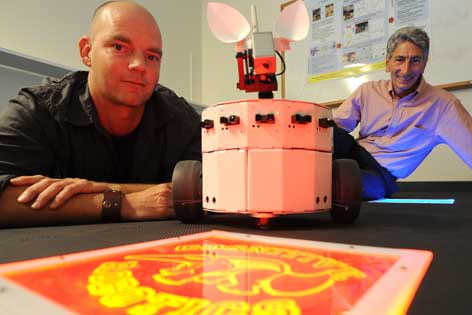Robot to clarify human decision-making
Study could shed light on adaptive decision-making in humans.

A robot powered by a computerized model of a rodent brain will help researchers from UC Irvine and UC San Diego understand how people recognize and adapt to change.
The $1.6 million joint study is expected to provide neuron-level insight about the specific brain areas responsible for decision-making and attention, advancing robotic design as well as knowledge of human behavior.
“Little is known about the areas of the brain involved in making decisions when faced with uncertainty,” says Jeffrey Krichmar, a UCI cognitive scientist and one of the study’s lead researchers.
Krichmar specializes in neurorobotics, or programming robots with real-life organic and neural data to simulate thinking, moving beings. His work with CARL – a robot with a biologically plausible nervous system controlled by a realistic model of the human brain – has led to several advances in the field, the most recent of which are featured in the September issue of IEEE Robotics & Automation Magazine.
Collaborating with Krichmar are UCSD researchers Andrea Chiba, Douglas Nitz and Angela Yu, who will develop the data for the study by testing the decision-making abilities of rodents during a task in which the locations of stimuli that predict food rewards change abruptly, requiring the rats to adapt to the new environment in order to receive food rewards.
Brain recordings taken from the rodents during the task will be digitally analyzed and programmed into CARL’s software-controlled “brain,” enabling the robot to replicate the same behavior.
“We know the areas of the brain supposedly involved in predicting and adapting to uncertainty, but getting a complete picture of what happens in a real human brain isn’t technically feasible,” Krichmar says.
“As the robot navigates the same challenging situations the rats faced, though, we’ll be able to actually see the areas of the simulated human brain being utilized to make decisions and the physical changes taking place.”
In addition to potential health applications, study findings are expected to advance the field of robotics, facilitating development of a brain-based algorithm letting robots behave effectively in complex and variable environments.
The three-year study, funded by the National Science Foundation, began in September, with UCI and UCSD each awarded $800,000.